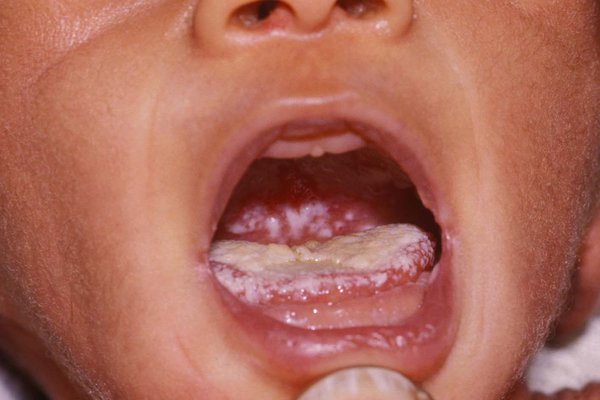
Thrush: A Common Fungal Infection in Infants
Thrush is a common fungal infection that affects the mouth and throat of infants. It is caused by the Candida albicans fungus, which is normally present in small amounts in the mouths of healthy babies. However, when the fungus overgrows, it can cause thrush.
Symptoms of Thrush
The most common symptom of thrush is white or yellow patches on the tongue, cheeks, or roof of the mouth. These patches may be slightly raised and have a cottage cheese-like appearance. Other symptoms of thrush can include:
- Difficulty swallowing
- Fussiness or irritability
- Loss of appetite
- Oral pain
- Redness or swelling of the mouth or throat
Causes of Thrush
Thrush is most commonly caused by an overgrowth of the Candida albicans fungus. This can occur for a number of reasons, including:
- Antibiotic use: Antibiotics can kill the good bacteria that normally keep Candida albicans in check. This can lead to an overgrowth of the fungus and thrush.
- Weak immune system: Infants with weakened immune systems are more likely to develop thrush. This can be due to premature birth, low birth weight, or other health conditions.
- Poor oral hygiene: Not cleaning your baby’s mouth regularly can allow Candida albicans to grow and multiply.
- Exposure to Candida: Infants can be exposed to Candida albicans from their mothers during childbirth or from other sources, such as contaminated pacifiers or toys.
Diagnosis of Thrush
Thrush is usually diagnosed based on a physical examination of the mouth and throat. Your doctor may also order a culture to confirm the diagnosis.
Treatment of Thrush
Thrush is typically treated with antifungal medication. This medication can be given orally or applied directly to the affected areas. Treatment usually lasts for 7-14 days.
Prevention of Thrush
There are a number of things you can do to help prevent thrush in your baby, including:
- Practice good oral hygiene: Clean your baby’s mouth regularly with a soft cloth or gauze pad.
- Avoid antibiotic use: Only give your baby antibiotics when they are absolutely necessary.
- Strengthen your baby’s immune system: Breastfeeding can help to strengthen your baby’s immune system and protect them from thrush.
- Avoid exposure to Candida: Keep your baby away from people who are sick with thrush.
Complications of Thrush
Thrush is usually a mild infection, but it can sometimes lead to complications, such as:
- Esophageal thrush: This is a more serious form of thrush that affects the esophagus. It can cause difficulty swallowing, chest pain, and weight loss.
- Invasive candidiasis: This is a rare but serious infection that can occur when Candida albicans enters the bloodstream. It can cause organ damage and even death.
When to Call the Doctor
Call your doctor if your baby has any of the following symptoms of thrush:
- White or yellow patches on the tongue, cheeks, or roof of the mouth
- Difficulty swallowing
- Fussiness or irritability
- Loss of appetite
- Oral pain
- Redness or swelling of the mouth or throat
Outlook for Thrush
Thrush is usually a mild infection that can be easily treated. However, it is important to seek treatment promptly to prevent complications.
